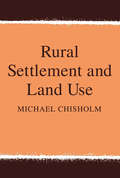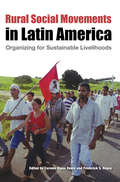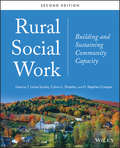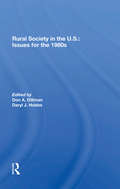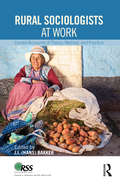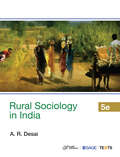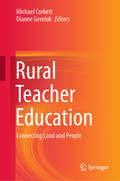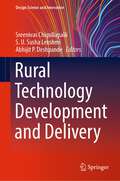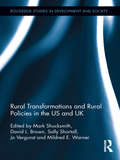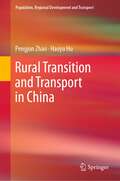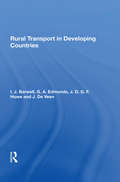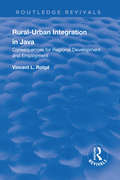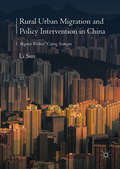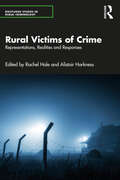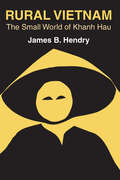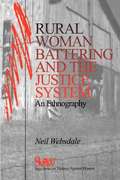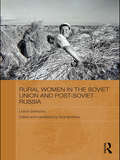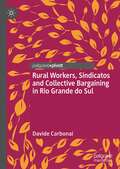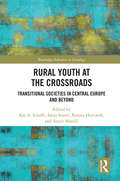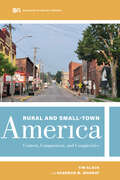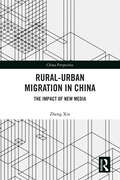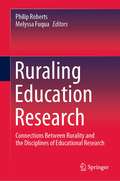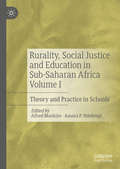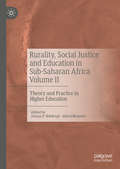- Table View
- List View
Rural Settlement and Land Use: An Essay In Location
by Michael ChisholmTo a remarkable extent, students of location problems have fastened attention upon industrial and urban matters rather than upon agricultural and rural affairs. The preponderance of the former studies undoubtedly reflects the relative importance of the manufacturing and commercial sectors of the technically more advanced countries where most students of location matters have in the past resided. Perhaps it has also seemed that the locational problems posed by city life and factory employment are more amenable than those of the countryside to rigorous analysis.
Rural Social Movements in Latin America: Organizing for Sustainable Livelihoods
by Carmen Diana Deere Frederick S. Royce"A remarkable collection. The chapters provide extremely useful information on a range of social movements generally not well covered in academic work--and the coverage is provided by people who are either activists within the movements themselves or long-time supporters."--Wendy Wolford, University of North Carolina "An original, unique, and excellent collection. The book has great theoretical value and political relevance."--Saturnino M. Borras Jr., Saint Mary's University (Halifax) All across Latin America, rural peoples are organizing in support of broadly distinct but interrelated issues. Food sovereignty, agrarian reform, indigenous and women’s rights, sustainable development, fair trade, and immigration issues are the focus of a large number of social movements found in countries such as Bolivia, Colombia, Mexico, Nicaragua, Brazil, and Peru. The contributors to Rural Social Movements in Latin America include academic researchers as well as social movement leaders who are seeking to effect change in their countries and communities. As a group they are at the forefront of some of the most critical environmental, social, and political issues of the day. This volume highlights the central role these movements play in opposition to the neoliberal model of development and offers fresh insights on emerging alternatives at the local, national, and hemispheric level. It also illustrates and analyzes the similarities--notably the struggle for sustainable livelihoods--as well as the difference among these various peasant, indigenous, and rural women's movements.
Rural Social Work
by T. Laine Scales H. Stephen Cooper Calvin L. StreeterA thoughtful text integrating strengths, assets, and capacity-building themes with contemporary issues in rural social work practiceNow in its second edition, Rural Social Work is a collection of contributed readings from social work scholars, students, and practitioners presenting a framework for resource building based on the strengths, assets, and capacities of people, a tool essential for working with rural communities.This guide considers methods for social workers to participate in the work of sustaining rural communities. Each chapter features a reading integrating the themes of capacity-building and rural social work; discussion questions that facilitate critical thinking around the chapter; and suggested activities and assignments.Rural Social Work, Second Edition explores:Important practice issues in rural communities, including the challenges of working with stigmatized populations such as gay, lesbian, bisexual, and transgendered people, the homeless, and people living with HIV/AIDSPractice models that hold special promise for rural social workers, including evidence-based practice and community partnership modelsNewer research tools such as asset mapping, social network analysis, concept mapping, and Geographic Information Systems (GIS)Exploring how social workers can integrate the tremendous resources that exist in rural communities into their practice, Rural Social Work, Second Edition provides a solid introduction to the complex, challenging, and rewarding work of building and sustaining rural communities.
Rural Society In The U.s.: Issues For The 1980s
by Don A Dillman Daryl J HobbsMust rural Americans pay the price of urban progress and modern lifestyles? How will the increased pressures of the 1980s affect those who live and work in rural communities? In addressing these overriding questions the authors of this book take a serious look at such issues as who will operate our farms and how those farms will meet rising demands for food, how higher energy costs will change life in rural areas, the current and future needs of rural families and their communities, who in fact lives in these communities, and what can be done about escalating rural crime and recent social changes that have disrupted the traditional patterns of rural society. Because the United States is an interdependent system of rural and urban, of providers and consumers, these issues are vitally important to all-scholars, policy makers, and citizens alike. The contributors bring us up to date on the contemporary rural scene and offer suggestions for research essential to intelligent decision making about the challenges and problems the 1980s hold in store for rural America.
Rural Sociologists at Work: Candid Accounts of Theory, Method, and Practice
by Johannes Hans BakkerThis collection of original chapters, written by prominent social scientists, elucidates the theory and practice of contemporary rural sociology. The book applies lessons from the careers of sociologists and their field research endeavors, covering a wide range of topics: agricultural production, processing, and marketing; international food security and rural development; degradation of the bio-physical environment across borders; and the study of community, family, health, and many other issues in an increasingly globalized world. The authors’ candid accounts provide insight into possibilities for enhancing opportunity and equality and serving basic human needs.
Rural Sociology in India
by A. R. DesaiOver the years, this historic work, which provides a comprehensive picture of the emergence of rural society in India, has become a classic text. With greater emphasis being placed on rural development for the transformation of the life and conditions of the rural populace, the study of rural society is gaining importance not only among the sociologists and economists but also among the administrators, policy makers and politicians. Rural Sociology in India attempts to present in one volume significant writings from the large body of literature on various aspects of Indian rural society. It discusses the multiple viewpoints of the diverse methods and techniques adopted to study the different domains of rural society, portraying its multi-sided and complex nature. This book provides the crucial theoretical projection about the future of not merely the agrarian social order, but also that of the underdeveloped countries as a whole. The readings chosen in this volume will help students to understand the diverse aspects of Indian rural life and stimulate their interest to undertake further studies on this subject. With contributions from B. Subbarao, O. H. K. Spate, N. K. Bose, Daniel Thorner, K. S. Shelvankar, D. D. Kosambi, D. Chattopadhyay, A. S. Altekar, H. D. Malaviya, Ramkrishna Mukherjee, Irawati Karve, Shanti Bhushan Nandi, D. S. Tyagi, Martin Orans, Surajit Sinha, G. S. Ghurye, S. M. Shah, Sulekh Chandra Gupta, Nirmal Kumar Bose, D. R. Gadgil, Uday Mehta, E. Kathleen Cough, Bernard S. Cohn, Y. B. Damle, D. N. Majumdar, Hamza Alavi, P. S. Sanghvi, V. M. Dandekar, O. J. Kundanpur, M. B. Desai, A. M. Khusro, P. C. Joshi, Arun Chandra Guha, Hugh Gray, P. K. Chaudhari, Yogendra Singh, S. Thirumalai, Acharya Vinoba Bhave, C. G. Shah, Manmohan Choudhuri, T. K. Oommen, B. T. Ranadive, David O. Mandelbaum, J. N. Majumdar, O. R. Gadgil, Myron Weiner, Lucio Mendieta Y. Núnez , M. N. Srinivas, S.C. Dube, Yogesh Atal, M. L. Dantwala, Surendra J. Patel, W. F. Wertheim, Paul A. Baran and Ernest Germain. Key Features: • Draws an outline of the design of living that has emerged in rural India. • Attempts to focus the attention on the need of a sociological perspective in studying rural life. • Valuable contribution from eminent scholars like Prof. Wertheim, Ernest Germain, Late Prof. Baran, Prof. Surendra Patel and others. • As per the UGC model curriculum, this book is an essential read for the core papers of Sociology and social work.
Rural Teacher Education: Connecting Land and People
by Michael Corbett Dianne GerelukThis book examines challenges associated with the education of teachers in and for rural places. It offers a new perspective with respect to how Canadian educators are shifting the conversation toward a hopeful discourse concerning how educators can foster meaningful rural learning environments, which will contribute to building stronger rural communities and regions. A central focus of the book is emerging reconceptualization of education, place and indigeneity in Canadian education in the wake of the Truth and Reconciliation CommissionThough the challenge of addressing rural teaching and learning lies partly in the nuances and complexities of unique places, there are also common threads that affect virtually all communities in rural, regional and remote educational, cultural, economic, and social geographies. Chapters in this collection provide current research in Canadian rural education including examples and stories from the field – contributed by teachers, administrators, and superintendents – on the challenges and creative opportunities that they have discovered in their own rural context, giving hope and inspiration for what is possible. The book will appeal to all readers interested in rural education and teacher education, as well as to those concerned with educational inequality and indigenous education.
Rural Technology Development and Delivery (Design Science and Innovation)
by Abhijit P. Deshpande Sreenivas Chigullapalli S. U. Susha LekshmiThis book comprises the proceedings of the 2nd international conference on Rural Technology Development and Delivery organized by Rural Technology Action group Indian Institute of Technology (IIT) Madras. The book highlights research on demand driven technologies and innovations, mostly on energy, environment, water resources, livelihood and smart technologies for the development of rural India. Spanning multi-disciplinary research aspects on rural technologies and development, this book would be useful for rural entrepreneurs, researchers, students and academic/R&D institutions for getting them involved in appropriate rural technology and development.
Rural Transformations and Rural Policies in the US and UK (Routledge Studies in Development and Society)
by David L. Brown Sally Shortall Jo Vergunst Mark Shucksmith Mildred E. WarnerThis book examines the transformations of rural society and economy in the UK and US during the last half-century, and explores the significance of these trends and changes for community sustainability, quality of life and the environment. While both the UK and US are highly urbanised, rural people and communities continue to contribute to national identity, economic development and social solidarity, as well as to environmental quality. Contributors explore the degree to which rural people exhibit agency and autonomy, rather than being merely passive in the face of exogenous forces of change in a globalised world. They also illuminate very different policy approaches to rural policy in two advanced capitalist societies often thought to be similar, and show how fundamental differences in rural policy approaches of the US and the UK are based on different social ideologies and values that shape policies relating to rural areas. This book will help to stimulate transatlantic dialogue on rural scholarship and rural policy analysis, while also contributing to theory and policy development. It will be of interest to researchers, students and everyone involved in the policy and practice of rural development.
Rural Transition and Transport in China (Population, Regional Development and Transport)
by Pengjun Zhao Haoyu HuThis book examines the rural transition and transportation in China. It covers demographic change, settlement transformation, and infrastructure development in rural areas, as well as changes in transportation expenditures, travel behavior, and accessibility of basic public services among rural Chinese residents. The book contributes to the new body of knowledge from an international perspective in three ways. First, it explores the changes in travel behavior of rural residents and related factors. Second, it provides new evidence on the relationship between rural social transformation and transportation infrastructure development. Third, it discusses the impact of transportation investments on rural poverty reduction. The book enhances our understanding of the changes in travel behavior of rural residents. In particular, the results of the multi-source big data analysis will provide new evidence on the link between social transformation and changes in travel behavior in rural China. It also helps planners and politicians to develop policies aimed at improving quality of life, rural poverty, and the efficiency of transportation investments in rural areas. The book is of great interest to scholars interested in rural transformation and development, sustainable transport, regional planning, and environmental policy and is relevant to China and other developing countries.
Rural Transport In Developing Countries
by I. Barwell G. A. Edmonds J.D.G.F. Howe J. De VeenFor more than three decades investment in the transport sector has been a priority for developing country governments. With a few exceptions, roads have accounted for the major part of these investments. The explicit, and often articulated, assumption upon which the decision to allocate such large sums of money to road transport has been made is that road transport and development are inextricably linked. The implicit, and rarely articulated assumption is that the provision of suitable roads will lead to the operation of an adequate level of road transport services. If roads do not actually produce economic development, it has been argued, they certainly play a major role. This belief in the ben-eficial effects of roads is not wholly unsubstantiated. Clearly the provision of some form of access is vital for the development of the rural economy. Nevertheless, the studies carried out over the last 10-15 years on the impact of highway investment have sounded a cautionary note. George W. Wilson, writing in the concluding chapter of the Brookings Institution studies on transport and development, suggested that* 'A much more sceptical attitude towards transport appears essential and far more attention needs to be devoted to the set of circumstances surrounding expansion of transport capacity'. 1 The suggestion of a more restrained attitude reflected a growing concern that transport, and in particular roads, was only one factor amongst a large number that needed to be integrated for effective development. The concern to see road transport in a wider context partly explains the move towards the evaluation of the social, as well as strictly economic, benefits of road construction.
Rural Urban Integration in Java: Consequences for Regional Development and Employemnt (Routledge Revivals)
by Vincent L. Rotgé Ida Bagoes Mantra Ryanto RijantaThis title was first published in 2000. Yogyakarta Special Region (known as Daerah Istimewa Yogyakarta in Bahasa Indonesia, or DIY) is located in the centre of the southern coast of Java. The region has a very long history and has undergone many changes and developments in agriculture, irrigation, population and immigration movements. Organized into four main sections, this text aims to provide a study of rural-urban integeration in the area, with particular reference to the consequences of development and employment. It introduces the region in geographical and economic terms, looking at the communities where fieldwork has been conducted. The results of these field studies are then presented, along with possible regional development policies geared towards encouraging the regional integration process. The important questions and implications of increasing rural-urban linkages for urban and societal changes in monsoon Asia are then reviewed on the basis of the lessons learned from the case studies in the DIY. Special attention is given to the consequences for employment and metropolitan changes in the wake of the changes taking place in this region.
Rural Urban Migration and Policy Intervention in China: Migrant Workers' Coping Strategies
by Li SunThis book examines rural-urban migration policies in China, and considers how Chinese workers cope with migration events in the context of these policies. It explores the contribution of migrant workers to the Chinese economy, the impact of changes within the ‘hukou’ system (household registration) and the impact of recent migration policies promoting rural-urban migration and targeting key events during migrant workers’ migration trajectories - job-seeking, wage exploitation, work injuries and illness - namely the corresponding ‘Skills Training Program for Migrant Workers’, the ‘Circular on Managing Wage Payment to Migrant Workers’, the ‘Circular on Migrant Workers Participating in Work-Related Injury Insurance’, and the ‘New Rural Medical Cooperative Scheme’ (Health Insurance). Through in-depth interviews, it examines how when facing such challenges, migrant workers choose to either make a claim under existing policies, or use other coping strategies. The book notably proposes a typology of “coping” which includes a variety of administrative coping, political coping and social coping, and considers how workers in China harness the power of civil groups and social networks.
Rural Victims of Crime: Representations, Realities and Responses (Routledge Studies in Rural Criminology)
by Alistair Harkness Rachel HaleRural Victims of Crime offers a pioneering sustained assessment of ‘the rural victim’. It does so by examining and analysing the conceptual constructs of a victim and challenging the urban bias of victimisation and victimology in criminological study. Indeed, far too much criminological scholarship is based on the false assumption that rural areas are relatively crime free – and thus free, too, of victims. Providing international perspectives, chapters in this edited collection focus centrally on notions of place and space, and constructions of rural victims in a variety of contexts, exploring the impact that geographic location has on the type and prevalence of victimisation. The concept of victimisation is often considered in terms of interpersonal relationships between humans, neglecting the potent impact of victimisation of non-humans and the natural and built environment. Rural Victims of Crime discusses existing notions of victimology in relation to non-human subjects, broadening conceptualisations of the victim and associated impacts resulting from victimisation. Structured in three parts, Rural Victims of Crime conceptualises the rural victim, enhances understanding of the realities of rural victimisation and considers both formal and informal responses to rural victimisation. Chapters are accompanied by practical, contemporary case studies to connect theory with praxis. This book is an essential and valuable resource for academics, students and practitioners alike in the fields of criminology, criminal justice, rural studies, victimology, geography, sociology and spatiality.
Rural Vietnam: The Small World of Khanh Hau
by James B. HendryVietnam is a land whose features change dramatically within short distances--from mountains and high plateaus to coastal plains and inland swamps. To the south, the large delta formed by the Mekong and Lesser river systems inches forward yearly into the South China Sea. This delta, while hardly typical of all Vietnam, is one of the most fertile rice-producing regions of Southeast Asia. Its importance lies not only in the substantial contribution this area can, and will, provide, but it is also the area of most recent settlement by the Vietnamese. The study of its institutions reveals much about the prospects for social and economic change.The analysis of economic change in underdeveloped areas is beset with many complex questions: what factors account for economic activity? Among many signs of change, which are significant? How may one predict the probabilities of future economic development? Rural Vietnam: The Small World of Khanh Hau answers these questions for a Vietnamese rural community, in a detailed study that emphasizes the economic and non-economic factors that shape its present level of material well-being and its chances for future development.The author identifies a variety of forces that influence the economic activity of individuals and finds that these farmers display many more traits of rational economic calculation than is usually assumed to be the case among the peasantry. The book is thus at least a partial refutation of those who hold that village life is so bound by tradition and immersed in lethargy that it cannot be subjected to the kind of economic analyses and policies developed in industrial societies. During the Vietnam war period, Khanh Hau was subject to pressures from far beyond its boundaries, and this study illuminates the problems the conflict engendered throughout Vietnam.
Rural Woman Battering and the Justice System: An Ethnography
by Neil WebsdaleThe backbone of this book derives from lengthy conversations with 50 rural battered women, resident in various spouse abuse shelters in Kentucky.
Rural Women in the Soviet Union and Post-Soviet Russia (Routledge Contemporary Russia and Eastern Europe Series)
by Liubov DenisovaThis is the first full-length history of Russian peasant women in the 20th century in English. Filling a significant gap in the literature on rural studies and gender studies of the twentieth century Russia, it is the first to take the story into the twenty-first century. It offers a comprehensive overview of regulations concerning rural women: their employment patterns; marriages, divorces and family life; issues with health and raising children. Rural lives in the Soviet Union were often dramatically different from the common narrative of the Soviet history, and even during the Khrushchev "Thaw" in the late 1950s and early 1960s, rural women were excluded from its reforms and liberating policies. The author, Luibov Denisova - a leading expert in the field of rural gender history in Russia - includes material from previously unavailable or unpublished collections and archives; interviews; sociological research and oral traditions. Overall, the book is a history of all rural women, from ordinary farm girls to agrarian professionals to prostitutes and paints a unique picture of rural women’s life in the Soviet Union and post-Soviet Russia.
Rural Women's Health
by Belinda Leach Wilfreda Thurston Beverly LeipertThe well-being of rural communities affects the well-being of those who reside in towns and cities because of rural-urban connections through food, drinking water, infectious disease, extreme environmental events, recreation, and for many, retirement residence. In rural areas themselves, women play a critical role in the health of their families and communities, yet women's health is often marginalized or ignored. There have been limited studies to date about rural women and health in Canada. Filling an important gap in scholarship, this collection identifies priority issues that must be addressed to ensure these women's well-being and offers innovative theoretical and methodological ideas for improvement.Rural Women's Health integrates perspectives from rural practitioners, residents, and scholars in a variety of fields, including nursing, sociology, anthropology, and geography, to tackle issues relevant to diverse settings across the country. As such, it presents a national perspective on the nature of women's health while respecting internal and regional diversity, as well as viewpoints from international scholarship.
Rural Workers, Sindicatos and Collective Bargaining in Rio Grande do Sul
by Davide CarbonaiThis Palgrave Pivot provides an overview of rural labour relations in different regions of the State of Rio Grande do Sul, in southern Brazil. Based on rich ethnographic research, through interviews with a long list of rural workers and union members, among others, the study highlights the toughness faced by salaried workers, who deal with difficulties in union representation and, above all, suffer different types of exploitation. Using a systemic approach, this book connects rural workers, union representation, and labour regulation to examine where society has failed and what can be done to protect rural workers.
Rural Youth at the Crossroads: Transitional Societies in Central Europe and Beyond (Routledge Advances in Sociology)
by Kai A. Schafft Sanja Stani 263 Renata Horvatek Annie MaselliFeaturing chapters by an international group of scholars and academics, Rural Youth at the Crossroads discusses the challenges and contexts facing youth from rural communities in countries with legacies of socialism undergoing social, political, and economic transition. The chapters employ a variety of sources and approaches to examine rural youth outcomes, and the well-being and sustainability of rural areas. The book focuses particularly on career and educational goals, the often contradictory relations between rural schools and communities, majority-minoritized group relations, community engagement, and political attitudes. Individual chapters examine these questions and dynamics within Croatia, Czechia, Hungary, Romania, Russia, Serbia, and Vietnam. In total the volume represents a unique and timely comparative discussion of the relationship between youth and rural development within transitional societies, and the challenges and opportunities for enhancing the well-being and sustainability of rural communities. Aimed at informing strategies to revitalize rural social space, this book is targeted towards social scientists with interest in sociology and rural sociology, demography, education, youth development, community/regional development, rurality, public policy, and identity formation in transitional contexts. As such, this book will have international appeal to researchers, educators, and policymakers in transitional countries, and to those interested in these topics, regions, and communities.
Rural and Small-Town America: Context, Composition, and Complexities (Sociology in the Twenty-First Century #9)
by Tim Slack Shannon M MonnatContemporary America is centered around urban society. Most Americans reside in cities or their surrounding suburbs, and both the media and modern American sociology focus disproportionately on urban life. Rural and Small-Town America looks at what we can learn from rural society and confronts common myths and misunderstandings about rural people and places. Tim Slack and Shannon M. Monnat examine social, economic, and demographic changes and how these changes pose both problems and opportunities for rural communities. They assess changes in population size and composition, economies and livelihoods, ethnoracial diversity and inequities, population health and health disparities, and politics and policies. The central focus of this book is that rural America is no paragon of stability. Social change abounds, accompanied by new challenges. Through analysis of empirical evidence, demographic data, and policy debates, readers will glean insights about rural America and the United States as a whole.
Rural-Urban Migration in China: The Impact of New Media (China Perspectives)
by Zheng XinThis book attempts to document and analyse the complicated role new media play in the adaptation and integration of China’s new generation of migrant workers. By analysing the interviews and observations of more than five hundred migrant workers under the age of 25 between 2010 and 2015, the author tries to understand how new media shape the experiences of this significant group of people at different stages of their lives. This study profiles the daily life of this new generation of migrant workers and examines the intricate connections between media and the reconstruction of migrant workers’ identity, as well as their urban life adaptation and social inclusion. Not only is their interaction with new media a key factor in decisions to migrate to the city in the first place, but it continues to play a crucial role in how their outlook on life, sense of identity, lifestyle, personal relationships, and aspirations change as they navigate their new environment. These findings reveal the impact of new media on China’s accelerating urbanization and modernization. This book will be of interest to students and scholars of Contemporary China Studies, and those who are interested in the urbanization of China in general.
Ruraling Education Research: Connections Between Rurality and the Disciplines of Educational Research
by Philip Roberts Melyssa FuquaThis edited volume brings together a collection of chapters from leading scholars in rural education with the purpose of linking knowledge from the rural education field to the wider discipline of education studies. Through addressing significant issues in the rural education field, the book gives insights from rural education that have general relevance for the wider disciplines of education, and provides up-to-date scholarship in research in rural contexts.This book aims to be a definitive and comprehensive edition of contemporary rural education scholarship that works as a guide for those new to researching in and for rural contexts, as well as actively expand the other sub-fields of education from a rural perspective. It examines the connection between rurality and the other domains of educational research, exploring what a rural perspective might bring to the broader fields of educational research, and how it might evolve them. In its unique approach, this book brings the concept of ‘rural’ to the disciplines of education; chapters regarding the ethics of research in the rural context speaks to a gap in rural education, and provide tools for engaging marginalised communities more generally in educational research.
Rurality, Social Justice and Education in Sub-Saharan Africa Volume I: Theory and Practice in Schools
by Alfred Masinire Amasa P. NdofirepiThis book explores rurality and education in sub-Saharan Africa through a lens of social justice. The first in a two-volume project, this book explores the possibilities and constraints of rural social justice in diverse educational contexts: how should rurality be defined? How does education shape and reshape what it means to be rural? Drawing chapters from a diverse range of contributors in sub-Saharan Africa, the two volumes are underpinned by a robust social justice approach to rural schooling and its intersections with access, gender, colonialism, social mobility and dis/ability. Ultimately, these volumes reflect the need to shift conceptions of rurality from colonial and conservative stereotypes to an appreciation of rurality as locations in space and time, with their own unique attributes and opportunities. Harnessing indigenous African concepts of justice to open up conversations into teaching and knowledge production in higher education, this book will be of interest to scholars of rurality and education, as well as wider discussions on decolonising the academy.
Rurality, Social Justice and Education in Sub-Saharan Africa Volume II: Theory and Practice in Higher Education
by Alfred Masinire Amasa P. NdofirepiThis book explores rurality and education in sub-Saharan Africa through a lens of social justice. The second volume of a two-volume project, this book explores possibilities and constraints of rural social justice in diverse educational contexts, with particular emphasis on higher education. Drawing on contexts from across sub-Saharan Africa, this volume examines such topics as student-teacher preparation, post-colonialism and access and participation. In doing so, these volumes reflect the need to shift conceptions of rurality from colonial and conservative stereotypes to an appreciation of rurality as locations in space and time. Focusing on inclusivity and intersectionality, these books raise important questions into rurality and social justice, and champion openness for education in rural communities who may be excluded.
